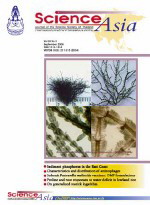ThaiScience
ThaiScience
SCIENCE ASIA
Volume 46, No. 1S, Month MARCH, Year 2020, Pages 43 - 50
Effects of ribosomal protein s3a (rps3a) on the survival of wssv-infected pacific white shrimp (litopenaeus vannamei)
Artorn Iatsui, Wilaiwan Chotigeat, Panchalika Deachamag
Abstract Download PDF
White spot syndrome virus (WSSV) causes substantial economic losses in shrimp farming. It has been reported that shrimp infected with this virus exhibits an overexpression of ribosomal protein S3a (RPS3a). Therefore, a recombinant protein, His-RPS3a, from shrimp was produced and its potential to protect shrimp from WSSV was evaluated. The purified His-RPS3a was injected at concentrations of 1–20 µg/shrimp to determine the expression of the genes prophenoloxidase (proPO) and phagocytosis-activating protein (PAP) by real-time PCR. PAP expression increased 4.1-fold when His-RPS3a was injected at 1 µg/shrimp, and proPO gene expression increased 5.3-fold when His-RPS3a was injected at 20 µg/shrimp. Therefore, shrimp were injected with His-RPS3a at concentrations of 10, 20, or 40 µg/shrimp for 3 days and then challenged with WSSV. The relative percentages of survival (RPS) of the WSSV-challenged shrimp after injection with the His-RPS3a were 23%, 27%, and 35%, respectively. Besides, RPS3a- phMGFP was prepared in the form of chitosan-DNA nanoparticles and fed at 75 µg/shrimp/day for 7 days. PAP expression was found to be higher than that in the control group. Furthermore, shrimp fed with RPS3a-phMGFP DNA at 75 µg/shrimp/day were challenged with WSSV and further cultured for 15 days. The RPS of the WSSV-challenged shrimp after feeding with RPS3a-phMGFP was 35%, whereas the control shrimp exhibited 100% death. These results demonstrated that RPS3a acts as an antigen and could delay the death of WSSV-infected shrimp by activating the general immune system; furthermore, RPS3a may be activated after WSSV infection to induce the production of proinflammatory cytokines.
Keywords
lead-free ceramic, bismuth sodium potassium titanate, magnetocapacitance, leakage current densitySCIENCE ASIA
Published by : The Science Society of Thailand
Contributions welcome at : http://www.scienceasia.org/
